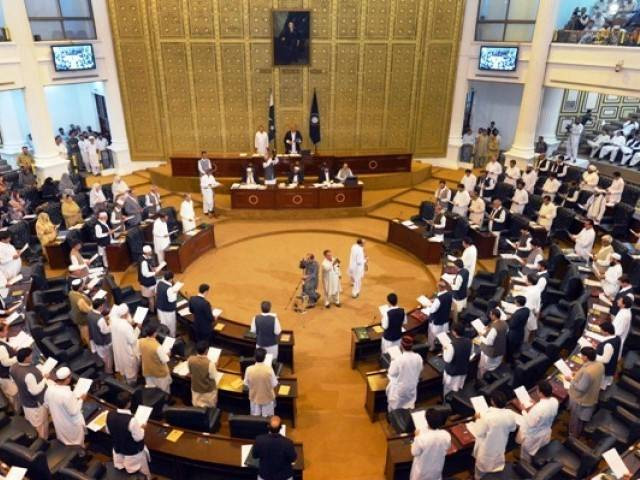K-P outlaws interest on private loans
Also enacts a law encouraging people to make public-interest disclosures

Also enacts a law encouraging people to make public-interest disclosures.
PHOTO: AFP
The bill was titled ‘Khyber-Pakhtunkhwa Prohibition of Interest on Private Loans’.
The house also passed the ‘Khyber-Pakhtunkhwa Whistleblower Protection and Vigilance Commission Act, 2016’, enabling citizens to make public-interest disclosures.
Earlier, lawmakers of Pakistan Tehreek-e-Insaf (PTI) and Pakistan Muslim League-Nawaz (PML-N) reproached each other over protest techniques they employed.
The two sides had been at loggerheads since PML-N activists stormed the assembly building last Sunday.
Advisor to the chief minister on communication and works Akbar Ayub moved a point of order at the end of the assembly session, asking the house to take the matter seriously as the incident dishonored the assembly.
Scores of PML-N workers protesting against the PTI’s Raiwind march stormed the assembly and a few climbed the building’s gate, hoisting their party flag.
The debate started when Raja Faisal Zaman of PML-N ‘disowned’ PML-N workers involved in the attack. “We have shown this path to others and they are now following it,” he said, referring to PTI’s Islamabad sit-in.
“PTV offices were attacked and occupied, the Supreme Court building was despoiled and workers put up their washed clothes for drying on Supreme Court walls. The gate of the Prime Minister House was broken. We have set a precedent, which is now being followed by everyone,” Zaman said criticizing the political style of PTI.
“Just as PTI disowned those who attacked the Supreme Court, PM House, PTV offices and kept the city hostage for over three months, I disown those who hoisted flags on the assembly gates,” he explained.
Zaman said that what happened on Sunday was condemnable, but he blamed PTI for the incident.
Terming the incident a ‘very serious issue, Chief Minister Pervez Khattak said: “Action will be taken against those who were responsible (for the incident).”
Subsequently, Speaker Asad Qaiser announced that he had sent a letter to the Inspector-General Police (IGP) to probe the case and take action against relevant persons.
“I (have) directed the IGP to submit the inquiry report within a week.”
Opposition members criticised the PTI for the proposed Raiwind march, but the minister for public health engineering Shah Farman maintained that the march was their legal right.
Legislation
The bill, aimed at eliminating interest on private loans, states that no money lender, either individually or in group of persons, shall lend money for cars or any other purpose, or advance loan to any person for receiving interest, or carry on an interest-based transaction in the province.
It prescribes Rs1 million fine with a maximum prison term of 10 years for persons lending money on interest or interest-based transactions.
The same punishment and fine will be awarded to people abetting, engaging or aiding a money lender in recovery of interest or interest-based transactions. The bill fixed a Rs500,000 fine and imprisonment of up to five years for people involved in molesting borrowers or debtors.
After the law is enforced, all liabilities for paying interest on debts will stand extinguished. The ‘Whistleblower Protection and Vigilance Commission Act, 2016’ encourages people to make disclosures regarding irregular, illegal and corrupt practices. The law grants 30 percent share to the whistleblower as a reward in the recovered amount along with a certificate of appreciation if it is proved that the whistleblower has rightly disclosed the violation.
If it is proved that a whistleblower lodged a frivolous or mala fide complaint, he shall be liable to a fine of 30 percent of the actual amount claimed against the person involved. In such cases, the whistleblower shall also be liable for three-year rigorous imprisonment term.
Published in The Express Tribune, September 20th, 2016.













COMMENTS
Comments are moderated and generally will be posted if they are on-topic and not abusive.
For more information, please see our Comments FAQ